- Home
- Kay Hooper
Always a Thief
Always a Thief Read online
Contents
Title Page
Author's Note
Prologue
Chapter One
Chapter Two
Chapter Three
Chapter Four
Chapter Five
Chapter Six
Chapter Seven
Chapter Eight
Chapter Nine
Chapter Ten
Chapter Eleven
Chapter Twelve
Chapter Thirteen
Chapter Fourteen
Chapter Fifteen
Chapter Sixteen
Bantam Books by Kay Hooper
Praise for Kay Hooper's Stealing Shadows
Preview
Copyright Page
AUTHOR'S NOTE
About ten years ago, I wrote a series of short contemporary novels for Bantam's Loveswept romance series. That's right—romances.
But a funny thing happened while I was writing those books. Although I enjoyed all the characters, one in particular was, quite literally, difficult to keep offstage when he wasn't supposed to be active in the story. My cat burglar Quinn practically walked off the pages, and even at the time my agent told me that “one day” I'd have to do more with him.
One day came.
Sometimes a writer is lucky enough to be able to look back at older work and be granted the opportunity to rewrite it as she wanted to write it at the time; I was writing series romance then, and there were simply things I couldn't do in the books because of what they were—and when they were. I am very proud of those books, but they were definitely stories written for a particular audience at a particular time.
At the time, I was unable—because of both the length of the books and the genre itself—to make the characters as complex as I wanted, to give them shades of gray, ambiguities of motive and personality. And since I was already, by then, feeling the need to stretch my wings, to write bigger, more complex books, I was very conscious that I was not providing Quinn and some other characters the wider canvas they deserved.
Which brings me to the second reason I wanted to include this note in the “Thief” books: Once a Thief and Always a Thief are not the books you remember if you read the original versions. They've been, in a sense, reimagined. I haven't just added a few thousand words here and there—I have restructured the stories in several ways.
Some scenes remain from the originals, but even those have been shifted, sometimes slightly, to provide a different perspective or provide that wider canvas for the characters. Some characters have either stepped back out of the spotlight or disappeared entirely from the narrative, and new ones are introduced. The same goes for some plotlines.
This is Quinn's story, or at least the beginning of it. And since he continued to be a lively presence in my writer's imagination long after his story was supposedly told, I gather he has more adventures in mind. We'll see.
If you've enjoyed my more recent suspense novels, I hope you'll give this one a try. It's not as dark and gritty as the Bishop books, and if there are any psychic elements—well, we'll just have to wait and find out about that—but Quinn is a lot of fun, and he's allowed me to show a lighter, more playful side of my writing.
My agent calls this sort of story a “caper, a bright, fun, witty adventure that holds on to its sense of humor even though there might well be deadly danger lurking about.”
Might well be . . . and there is. Because there's a spectacular collection of gems and artworks about to go on display, and more than one person is ready and willing to do whatever it takes in order to possess it. Even kill.
Come meet Quinn, and let me know what you think of him. I like him a lot. And I hope you do too.
PROLOGUE
The fog could have made it easier for Quinn to shadow his quarry without giving away his own presence, but he had already discovered that the shifting gray mist could be as unpredictable as a living creature, thick as pea soup one moment and wispy thin the next, so he stayed as far back as he could without losing the target.
It made things more difficult.
His foot slipped a bit on a fog-wet roof tile, and he made a mental note to look for a pair of newer, better soft-soled shoes for these nighttime excursions. That went through his mind even as his gloved hands reached for—and dislodged—another of the slippery tiles.
Quinn froze.
He had excellent night vision, but through the swirling fog it was difficult to be certain the man moving yards ahead of him on the same roof hadn't heard the faint sound. Quinn squinted, concentrated all his senses, and decided finally that the man was still moving slowly, cautiously, away from him.
Hardly breathing, testing every foothold, Quinn continued to follow his prey.
As he followed, from one rooftop to another across an expanse of several huge office buildings, something nagged at him. What? What was bothering him?
This was the third night he had managed to locate and stalk his prey, and so far nothing was different. Just a trip across rooftops, silent and cautious, in the darkness. Tonight there was a fog, but otherwise it was the same.
The same.
Exactly the same.
Quinn froze again, this time with realizations gathering in his mind. The same. The same goddamned route. The same time of night, to the hour. The same rooftops, none of them sheltering anything of interest to a thief of gems or artworks. The same difficult, physically demanding path testing both his nerve and his skills.
He was playing follow the fucking leader.
And he wasn't the leader.
He was being tested.
A rare anger swept over Quinn, but even stronger was the instinctive urge to break off immediately. Someone else was playing a dangerous game, and until Quinn knew the rules he had no intention of playing along.
He eased back and began his retreat, automatically planning the best path to take.
And he almost made it.
Avoiding an iron fire escape, as he did whenever possible because he'd found them to be unacceptably noisy, Quinn fastened a grappling hook securely and used the gear he usually carried to rappel down the side of the building and into the dense darkness of an alleyway.
He was no more than ten feet from the pavement when all his senses screamed a sudden warning that someone was nearby, too close—and he was dangling helplessly like a worm on a hook.
He barely had time to turn his head, had only an instant to see the shadowy outline of a man on the fire escape not far away, see the gleam of faint light on dark steel, and then a sound like a soft sneeze reached his ears in the same moment that Quinn made an instinctive effort to push himself away from the building and drop to the alley below.
He felt the bullet hit him, and the shock caused his legs to buckle as he reached the pavement. Hot pain washed over him, pain he fought to ignore as he looked up, searching the fire escape for the man who had shot him.
The fire escape was empty.
Quinn pressed a gloved hand to his chest, and when he brought it away he could see even in the darkness of the alley a wet gleam.
“Son of a bitch,” he muttered.
CHAPTER
ONE
Morgan West was beginning to get tense about the entire situation. The Bannister collection of priceless artworks and gems would be moved to the museum within days, which meant the bait would be in the trap. Neither Max Bannister nor anyone else had deigned to inform her that there was a trap, information she knew only because of an overheard conversation. And she hadn't seen—or felt—a sign of Quinn in weeks.
It was maddening.
She didn't fool herself into believing that Quinn wasn't uppermost in her mind. Once she'd gotten over her fury at having been presented with a concubine ring (though she fully intended to give h
im a piece of her mind about that little item when next they met), she had gone back to spending an hour or two of her evenings parked outside some likely museum or jewelry store, hoping to be able to sense him, feel him, whatever the hell she'd been able to do before. But he hadn't been kidding when he'd said if he didn't want to be found, not even she would be able to find him.
The most elusive thief in the world seemed to have no difficulty in eluding her.
Dammit.
She had read the newspapers front to back and had kept her ears open during her days at the museum, but if Quinn had robbed anybody they apparently didn't know it. There had been no splashy headlines about the world-famous cat burglar, and no breathless news bulletins on television.
In fact, nobody had reported a jewel or art robbery of any kind since Max Bannister, his half brother Wolfe Nickerson, and Interpol agent Jared Chavalier had captured a psychotic thief bent on murdering Storm Tremaine, the exhibit's computer expert.
With that leader of an organized gang of thieves out of business and the gang scattered and inactive, anybody with valuables to protect in the city had heaved an almost audible sigh of relief.
In Morgan's own museum, the Mysteries Past exhibit space was nearly ready for the priceless collection of gems and artworks now being cleaned and appraised in its vault. And barring a definite undercurrent of tension between Wolfe and Jared, things had been downright peaceful.
Morgan told herself she should be happy about that state of affairs. It was best for all concerned. Quinn had quite probably gone back to Europe, especially after she'd warned him about the trap.
Something she hadn't mentioned to Max.
Still, in spite of common sense and logic, she had the nagging feeling that Quinn hadn't left San Francisco. He was here somewhere, and if he hadn't committed a robbery it was probably because he was waiting for a chance to grab Max's collection—trap or no trap.
That was why she kept looking for him, she told herself. Because if the first warning hadn't worked, maybe she could come up with one he would pay attention to. It was, after all, her responsibility to guard the forthcoming exhibit from harm, and Quinn undoubtedly posed a threat she should guard against.
Yeah, right! she sneered at herself.
She was an idiot, there was no doubt about it. She should be doing everything possible to put his ass behind bars and never mind warning him.
She could have provided the police with a very accurate description of him. Did he know that? Of course he did. Did he worry about it? No, because he knew all too well she wouldn't say a word to the police about being able to describe him.
Dammit.
She refused to wear the concubine ring—no matter how beautiful it was—but she hadn't exactly dumped it in the garbage either. In fact, she had a habit of taking it from her jewelry box and staring at it for long minutes each night before she went to bed.
And wouldn't Freud have a field day with that.
On this particular Thursday night, Morgan had, with difficulty, talked herself out of her usual search for Quinn. She had occupied herself with paperwork and a late movie, then showered and dressed for bed in her usual comfortable sleepshirt. She paid a brief visit to her jewelry box and studied the glowing, square stone of the concubine ring, said a few heartfelt words about Quinn's probable ancestry out loud, and, her feelings vented somewhat, went to bed.
When she woke with a start, the luminous display of her alarm clock proclaimed that it was twenty minutes after three in the morning. It was very quiet, but she found herself lying rigidly beneath the covers, wide awake, her ears straining. Something had awakened her, she knew that. Something—
There. A faint sound from the front of the apartment, from the living room. A scratching sound, then a very soft creak, the way a floorboard protested weight.
Morgan held very strong views about guns. She believed that the vast majority of the people who owned guns probably shouldn't have been trusted with a slingshot, and she believed that anyone who had both a gun and a child of any age in the same house was guilty of criminal stupidity.
But she had also been on her own for too long to take dumb chances. So she had learned to handle guns, from experts, and she had bought an automatic to keep in her apartment. Twice a month, she went to a target range and practiced scrupulously to keep her aim true. She was, in fact, a crack shot.
So it was almost a reflex to slide very carefully from the bed, ease open the drawer of her nightstand, and take out the gun. It was another reflex to thumb off the safety and hold the weapon in a practiced two-handed grip.
Of course, it probably would have been smarter to creep into the bathroom with the gun and her portable phone—also on the nightstand beside her bed—lock the door, and call the police. But she didn't even think of that until much later. Instead, she crept toward the door of her bedroom, ears straining, trying to be utterly silent.
The hallway was short, and she lingered close to the wall just outside the living room, searching the dark room for any sign of movement. There—by the window. It was only a shadow, indistinct, but it didn't belong there.
Remaining close to the wall for cover, her eyes fixed on the shadow, Morgan managed not to startle herself with the clear strength of her own voice. “I have a gun,” she warned in a grim tone. “And I'll use it, believe me.”
“I believe you.” The voice was deep, masculine, and somewhat dry. “However . . . since American authorities haven't yet . . . put a price on my head . . . I'd rather you didn't. Shooting me for profit . . . makes perfect sense . . . to me . . . but I'm not . . . quite . . . ready for a mercy killing.”
She slumped. “Quinn.”
“Don't sound . . . so damned relieved, Morgana,” he reproved in an even dryer voice. “I may not . . . be a murderous fiend, but you should . . . at the very least . . . consider me . . . dangerous. I am . . . a known felon . . . after all.”
“You're a lunatic.” Automatically, she pointed the pistol at the floor as she eased the hammer back down and thumbed on the safety. She stepped into the living room and put the gun on a table by the wall, then turned on the lamp there.
It took a moment for her eyes to adjust to the sudden light, but when they did she found him near the window, his gloved hands resting on her high-backed reading chair. More disappointed than she wanted to admit to herself, she noted that his usual all-black cat-burglar costume included the ski mask that effectively hid his face. Why was he hiding his face from her when she'd already seen it?
“What are you doing here, anyway?” she demanded.
“Happened . . . to be . . . in the neighborhood,” he murmured.
Morgan took a step toward him, then another, frowning. He was standing too still, she thought, too stiffly. And something about the way he was speaking wasn't right. “Oh, really? And you just happened to climb up my fire escape and pick the lock on the window?”
“Lousy lock,” he said, his voice growing softer, almost slurring. “You . . . ought to get another.”
Forever afterward, Morgan was never certain at what moment she knew what had happened. But she began moving toward him more quickly, covering the space between them with hasty steps. Maybe it was pure instinct that told her what was wrong—the primal sensing of blood and weakness—but she knew with utter certainty that he was very badly hurt. As soon as she was closer to him, the fact was obvious.
“No police, Morgana,” he muttered in that soft, thickened voice. “Doctors have to report . . . report—” He swayed, and she was barely able to reach him in time to keep his head from striking the floor when he fell.
A light breeze was clearing out the fog, but the night retained that swathed-in-cotton silence the mist usually provided, so she was careful to make no noise as she glided away from Morgan West's apartment building.
Interesting. Very interesting indeed.
And surprising. So the seemingly infallible Quinn had a weak spot? An unexpected vulnerability in the armor of his heart—and hi
s brilliant mind?
She made her way to the car parked several blocks away and slid inside, only then allowing a soft laugh to escape her. She had come to San Francisco with one goal.
Now she had two.
“Quinn? Quinn?” The black of his sweater showed a dull, wet gleam high on his chest and on his left shoulder. A spreading gleam. And when she pulled the ski mask off, his lean, handsome face was ghostly pale and beaded with sweat, his flesh chilled. His eyes were closed.
Morgan had never felt so cold with fear, but first-aid training took over as she felt for the carotid pulse in his neck. His heart was beating, but faintly and the rhythm was all wrong; he was going into shock.
He was far too heavy for her to move. Keep him warm and elevate his legs, she told herself with a calm inner voice that came from God-knew-where. She dragged a heavy blanket from her bed and covered him, then lifted his legs carefully until they rested across a low hassock.
She didn't want to look at the wound but knew she had to, and Quinn's last mumbled words kept ringing hauntingly in her ears. She couldn't call a doctor, because doctors had to report violent wounds to the police, and the police wanted Quinn in the worst way.
Even so, Morgan knew with absolute certainty that Quinn alive and in jail would forever be her choice over Quinn dead and still an enigma to the police; if she had to make that decision, it was already made.
She used her sewing scissors and carefully cut his sweater open far enough to expose the wound. She didn't know much about this kind of thing, but she was certain she was looking at a bullet wound. One glance was enough; she made a thick pad of several clean cloths and pressed it gently over the sluggishly bleeding wound, fighting a queasy feeling. But that cool inner voice remained calm inside her head.
Not so bad. The bleeding's nearly stopped. Unless there's an exit wound . . . She slipped a hand under his shoulder and didn't know whether she should be relieved that the bullet was still lodged in his body. It isn't near the heart or lung. I think.

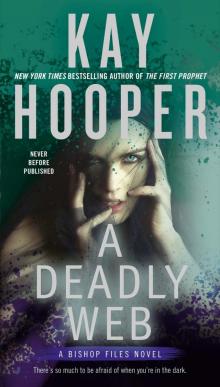 A Deadly Web
A Deadly Web Raven on the Wing
Raven on the Wing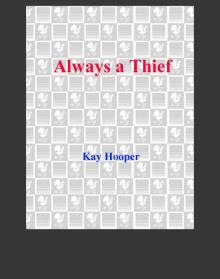 Always a Thief
Always a Thief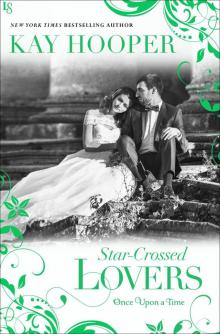 Star-Crossed Lovers
Star-Crossed Lovers Blood Dreams
Blood Dreams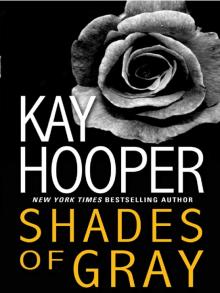 Shades of Gray
Shades of Gray Rebel Waltz
Rebel Waltz Chill of Fear
Chill of Fear Sleeping With Fear
Sleeping With Fear After Caroline
After Caroline Time After Time
Time After Time Haunting Rachel
Haunting Rachel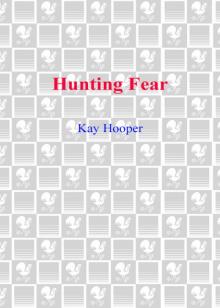 Hunting Fear
Hunting Fear Out of the Shadows
Out of the Shadows Whisper of Evil
Whisper of Evil Blood Sins
Blood Sins Hiding in the Shadows
Hiding in the Shadows C.J.'s Fate C.J.'s Fate C.J.'s Fate
C.J.'s Fate C.J.'s Fate C.J.'s Fate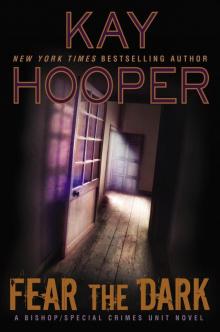 Fear the Dark
Fear the Dark Illegal Possession
Illegal Possession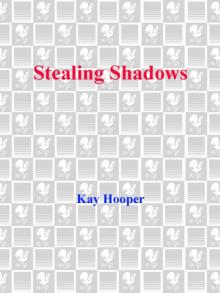 Stealing Shadows
Stealing Shadows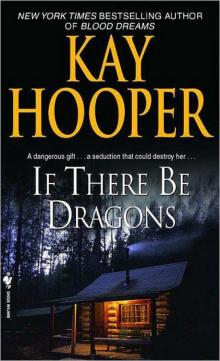 If There Be Dragons
If There Be Dragons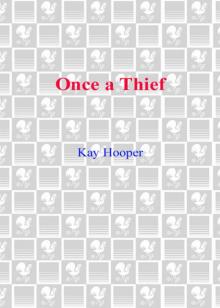 Once a Thief
Once a Thief In Serena's Web
In Serena's Web On Wings of Magic on Wings of Magic
On Wings of Magic on Wings of Magic Hostage
Hostage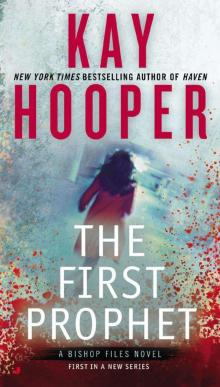 The First Prophet
The First Prophet Through the Looking Glass
Through the Looking Glass Golden Flames
Golden Flames Finding Laura
Finding Laura Haven
Haven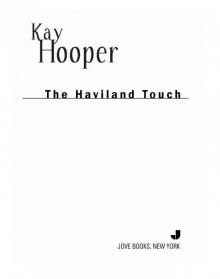 The Haviland Touch
The Haviland Touch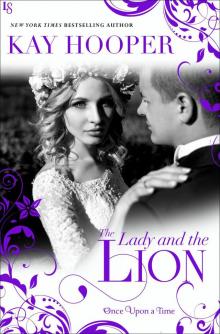 The Lady and the Lion
The Lady and the Lion Haunted
Haunted Velvet Ligntning
Velvet Ligntning Blood Ties
Blood Ties Adelaide, the Enchantress
Adelaide, the Enchantress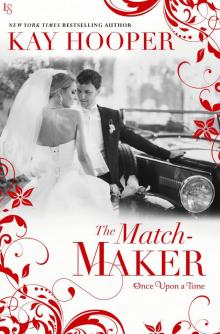 The Matchmaker
The Matchmaker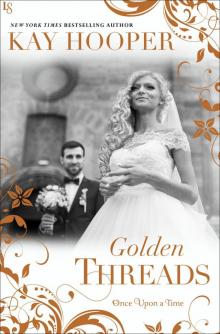 Golden Threads
Golden Threads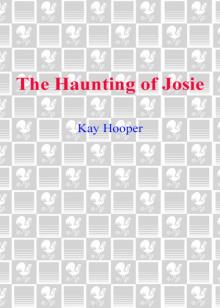 The Haunting of Josie
The Haunting of Josie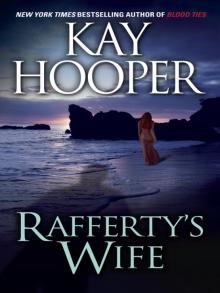 Rafferty's Wife
Rafferty's Wife Amanda
Amanda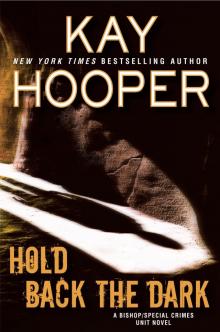 Hold Back the Dark
Hold Back the Dark Sense of Evil
Sense of Evil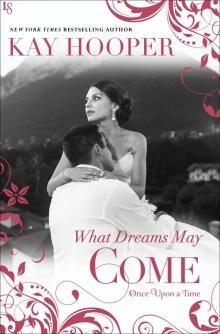 What Dreams May Come
What Dreams May Come Larger Than Life
Larger Than Life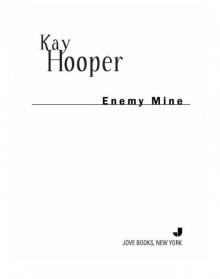 Enemy Mine
Enemy Mine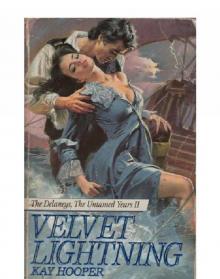 Velvet Lightning
Velvet Lightning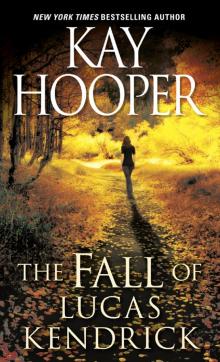 The Fall of Lucas Kendrick
The Fall of Lucas Kendrick Aces High
Aces High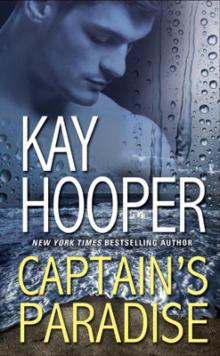 Captain's Paradise: A Novel
Captain's Paradise: A Novel The Wizard of Seattle
The Wizard of Seattle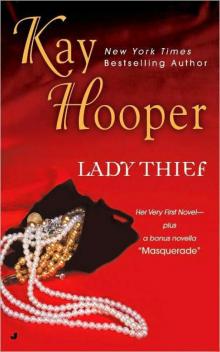 Lady Thief
Lady Thief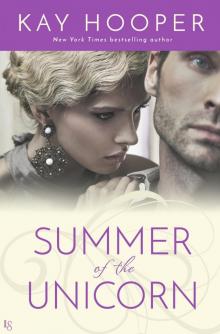 Summer of the Unicorn
Summer of the Unicorn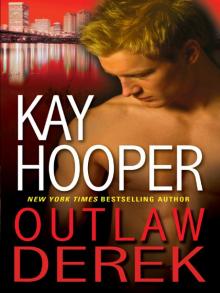 Outlaw Derek
Outlaw Derek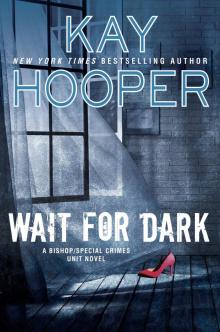 Wait for Dark
Wait for Dark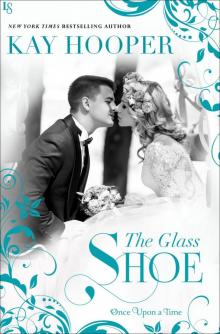 The Glass Shoe
The Glass Shoe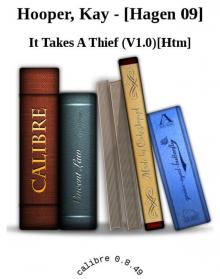 It Takes a Thief
It Takes a Thief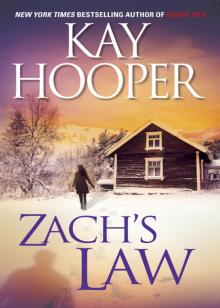 Zach's Law
Zach's Law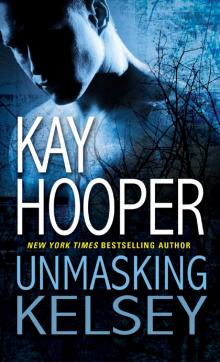 Unmasking Kelsey
Unmasking Kelsey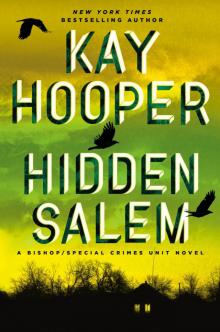 Hidden Salem
Hidden Salem